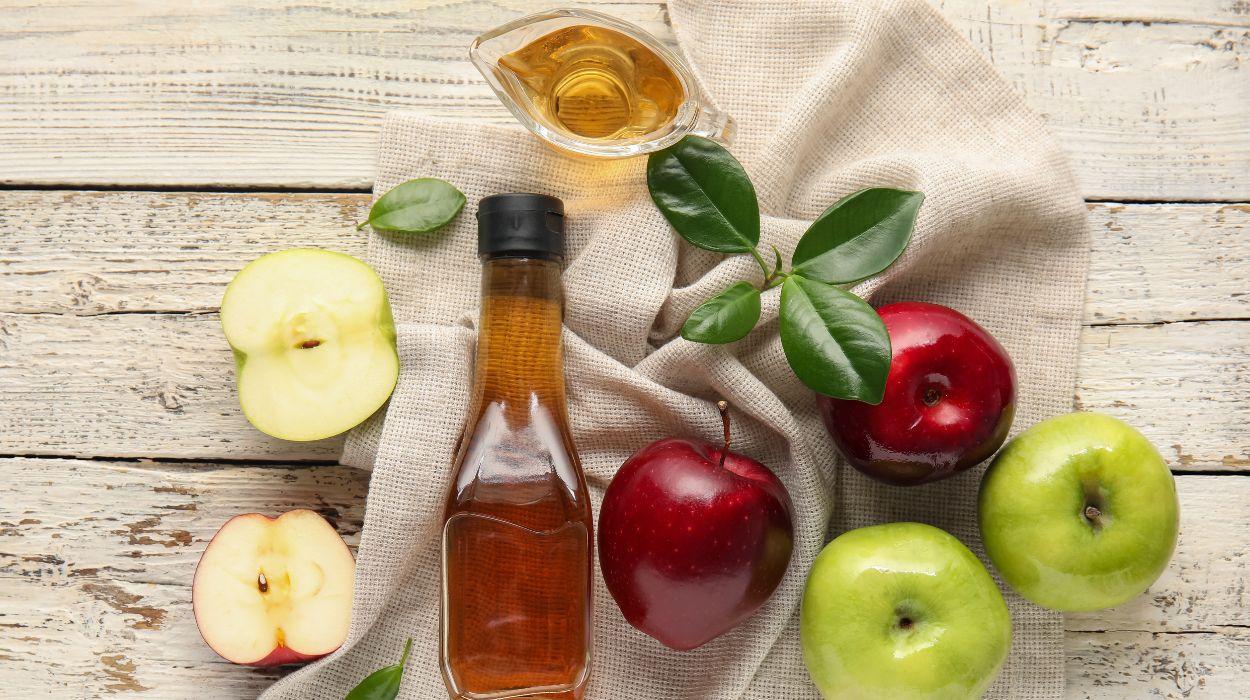 Expert's opinion
Expert's opinion
Expert's opinion
The article is a subjective view on this topic written by writers specializing in medical writing.
It may reflect on a personal journey surrounding struggles with an illness or medical condition, involve product comparisons, diet considerations, or other health-related opinions.
Although the view is entirely that of the writer, it is based on academic experiences and scientific research they have conducted; it is fact-checked by a team of degreed medical experts, and validated by sources attached to the article.
The numbers in parenthesis (1,2,3) will take you to clickable links to related scientific papers.
Apple Cider Vinegar For Weight Loss 2024 – Do They Work?

Apple cider vinegar (ACV) is often used to promote health and well-being, with the benefits that contribute to weight loss being one of the most popular. If you haven’t jumped on the bandwagon yet, you may be wondering what apple cider vinegar does for weight loss.
Losing weight is an evergreen topic that has people around the world looking for tips and tricks to either help speed it up or keep it off.
ACV For Weight Loss
Apple cider vinegar is one of the easiest tools you can try to help you lose weight as you can get it in any store or even make it at home. Its benefits for improving the health of your gut and scalp have been vastly reported, and now the connection to weight loss has people around the world interested in learning more about it.
Its medicinal properties have been documented for hundreds of years to treat a variety of issues. Today, studies have shown ACV’s potential, to help improve a variety of body functions.
How Much Apple Cider Vinegar To Use For Weight Loss?

The connection between apple cider vinegar and weight loss starts with feelings of satiety. Studies show[1] that taking apple cider vinegar can increase a feeling of fullness, leading people to eat fewer calories throughout the rest of their day. They also show its impact on lowering glucose levels, preventing overstimulation of insulin secretion, and with it, inflammation.
The active compound in ACV called acetic acid may block enzymes[2] that help you digest starch. By doing this, foods that naturally contain a lot of starch, such as bread, pasta, and rice are not absorbed as well and thus create a lower blood sugar spike and insulin secretion. That’s why many people take it before their meals, especially if they know they’ll be eating plenty of carbohydrates.
Research shows[3] how taking four teaspoons (20 ml) of apple cider vinegar before meals significantly reduce blood sugar levels after eating, even in those with serious insulin-related disorders such as type 2 diabetes. This also consequentially helps lower the body’s inflammatory response that is caused by a blood sugar spike and followed by a blood sugar crash[4].
The so-called “apple cider vinegar diet” has been extremely popular in recent years as a means of detoxification and cleansing. This popularity has been based on studies done in obese rats and mice which suggest that acetic acid in apple cider vinegar can prevent fat deposition and improve their metabolism.
The study[5] that propelled the diet and pushed weight loss into the spotlight concerns 175 obese subjects that showed how daily apple cider vinegar consumption over three months led to reduced belly fat and weight loss. Those who consumed 1 tablespoon lost 2.6 pounds and the ones who consumed 2 tablespoons lost 3.7 pounds. In addition, all subjects had lower triglyceride levels than those who drank no vinegar.
A more recent study[6] followed 39 subjects who were on a restricted diet over 12 weeks. Those who also took apple cider vinegar lost more weight than those who only followed a restricted diet alone.
Unfortunately, all of these studies have been short and done on a small number of people, so any conclusive results are hard to concrete. Still, that does not mean that apple cider vinegar does not come with a variety of nutritional benefits that can consequently, help promote weight loss.
How to Take Apple Cider Vinegar for Weight Loss
Even though the studies aren’t exactly giving out specific recommendations for weight loss, there are some practices you can implement and use in your diet to help control your weight, lower your blood sugar levels, and reduce your body fat mass.
How To Drink Apple Cider Vinegar For Weight Loss In 1 Week?
There are a few known ways to include apple cider vinegar in your diet and promote weight loss:
- Drinking it mixed with water, either alone or with pure lemon juice and cayenne pepper to further promote metabolism and digestion
- Using it mixed with olive oil either as a salad dressing or even on top of fish meals
- Pickling vegetables and using them in everyday meals
- Mixing turmeric and apple cider vinegar for weight loss
If drinking apple cider vinegar, make sure you’re diluting it properly. Diluted apple cider vinegar used for weight loss is 1–2 tablespoons (15-30 ml) per day. This follows the aforementioned studies, trying to mimic their positive results. It seems that you get the most benefits by taking 2–3 doses throughout the day before your meals, especially carb-heavy meals.
Taking higher doses can potentially have harmful side effects such as the erosion of tooth enamel[7], so it’s best to start small and slowly build up from there. Also, taking diluted apple cider vinegar is crucial as undiluted vinegar may burn the inside of your mouth and esophagus. Acetic acid is very strong and depending on the sensitivity of your digestive tract and in certain conditions like type 2 diabetes[8], it might cause more problems than you’d predict.
Does Apple Cider Vinegar Help You Lose Weight?
7 Reasons You Need To Drink Apple Cider Vinegar Every Night Before Bed
Firstly, The nutritional profile of apple cider vinegar alone showcases its great potential in promoting overall health and longevity. It’s rich in antioxidants[9], helping you fight free radicals and the oxidative damage they can cause. This in turn lowers inflammation and can help you fight unwanted fat when you start your weight loss journey.
Secondly, Apple cider vinegar also helps kill bacteria[10] and pathogens, making it the perfect cleaning and disinfecting tool, as well as an amazing wound-cleaning solution. Studies also show[10] how it inhibits bacteria like Escherichia coli from growing and spreading, making it a great way to preserve your food. The same studies show its effectiveness against Candida albicans and Staphylococcus aureus, putting a focus on its antifungal and antibacterial properties.
Thirdly, Animal studies[11] show how apple cider vinegar may benefit heart health, contributing to lower cholesterol and triglyceride levels. This helps reduce the overall inflammation of the cardiovascular system and lowers the risk of heart disease.
Fourthly, some studies show[12] its ability to reduce blood pressure
Fifthly, it’s the potential in keeping inflammation at bay and protecting the heart and blood vessels.
Sixthly, There is also a possible connection between apple cider vinegar and polycystic ovarian syndrome, or PCOS. This comes from a three-month study[13] that found that women with PCOS who drank one tablespoon (15 ml) of apple cider vinegar with 100 ml (7 oz) of water straight after dinner had improved their hormone levels and experienced more regular periods.
And last, but not least, apple cider vinegar has often been connected with the successful treatment of dandruff[10] and improved skin health[14], treating skin conditions like dry skin and eczema. Although not directly connected to weight loss, any form of reducing inflammation can help your body optimize its functions and promote losing weight.
How Is Apple Cider Vinegar Made?
Making apple cider vinegar is fairly easy. There are two steps[15] in this process:
- First, apples are crushed into yeast, which ferments the sugars and turns them into alcohol.
- Second, bacteria are added to further ferment the alcohol and turn it into acetic acid, which is the main active compound in apple cider vinegar.
Acetic acid is the main active compound which researchers believe is the reason for the myriad of apple cider vinegar’s health benefits.
The vinegar can be filtered or raw. When you see raw apple cider vinegar, you may notice a murky appearance that contains a substance called the “mother”. This consists of strands of proteins, enzymes, and friendly bacteria that create a more active, nutrient-rich environment.
That’s why many people believe that “the mother” is contributing to even more health benefits. Even though there isn’t any clear evidence to support these claims, people still tend to go for the raw, unfiltered apple cider vinegar rather than the clear bottle.
Weight Loss

Losing unwanted weight has been a topic everyone’s been interested in for years, and over the last decade, many new ways of promoting weight loss have been discovered. With it, a variety of helpful lifestyle changes as well as nutrition aids have been put in the spotlight as possible magic tricks that can be beneficial in more ways than one.
The most important thing to remember when it comes to weight loss is that it’s not just about calories[16]. The pure nutritional component of “calories in vs calories out” does have a solid foundation, but it’s more about what’s in those calories that will determine how your weight loss journey is going to go.
Processed foods and excess sugar create inflammation[17] in the body, no matter the number of calories you consume. You can be in a calorie deficit, expending a significantly higher amount of calories than you consume, and still have issues with losing weight if you’re not eating the right type of foods. The inflammatory response your body goes through is not so easy to ignore and dealing with the consequences might need much more work than just cutting down your caloric intake.
This is where tools like apple cider vinegar come in, helping your body cleanse from toxins and reduce inflammation to facilitate weight loss.
Apple Cider Vinegar Products
Due to popular demand, many companies have created apple cider vinegar products such as keto acv gummies and tablets. These have their virtues as they can prevent burns and overdose. In addition, they’re usually packed with additional vitamins and minerals which can help you lose more weight and add on other health benefits.
Best Apple Cider Vinegar Brands
Other than just taking any apple cider vinegar in your local grocery store, it’s important to know which ones are of the best quality. This will be based on how potent they are and whether or not they can deliver all of the health benefits they promote.
Always look for those with low sugar content and no additional sugars, as pure apple cider vinegar contains a very low amount of calories. This further adds to its weight loss potential. Some of the most popular brands of today include:
- Fairchild Organic
- Dr. Bragg
- Dynamic Health
- Kevala
- Vermont Village
- Wedderspoon
- Goli
- Peak Purity
Final Thoughts
Apple cider vinegar seems to be a fantastic superfood that promotes an overall reduction in inflammation, helping fight free radicals and oxidative damage, and encouraging all body systems to run smoothly. Even though the studies connecting apple cider vinegar and weight loss are scarce, they give enough information to potentially include it in your diet and notice the changes.
Apple cider vinegar is not a magic pill, so adequate lifestyle changes still have to be made for weight loss to occur. Regular exercise, keeping a clean diet, improving sleep duration and quality, as well as reducing and managing stress are all important factors that need to work in conjunction to help you lose unwanted weight. Taking apple cider vinegar can only be a bonus.
With that in mind, start small and slowly build up your daily dosage to prevent burns and other potential side effects of the strong acetic acid. Go for the trusted brands and if you’re feeling adventurous, try to make your own, always making sure you properly dilute it before consumption.
+ 17 sources
Health Canal avoids using tertiary references. We have strict sourcing guidelines and rely on peer-reviewed studies, academic researches from medical associations and institutions. To ensure the accuracy of articles in Health Canal, you can read more about the editorial process here
- Östman, E., Granfeldt, Y., Persson, L. and Björck, I. (2005). Vinegar supplementation lowers glucose and insulin responses and increases satiety after a bread meal in healthy subjects. [online] 59(9), pp.983–988. doi:https://doi.org/10.1038/sj.ejcn.1602197.
- Farideh Shishehbor, Mansoori, A. and Fatemeh Shirani (2017). Vinegar consumption can attenuate postprandial glucose and insulin responses; a systematic review and meta-analysis of clinical trials. [online] 127, pp.1–9. doi:https://doi.org/10.1016/j.diabres.2017.01.021.
- Johnston, C.S., Kim, C.M. and Buller, A.J. (2004). Vinegar Improves Insulin Sensitivity to a High-Carbohydrate Meal in Subjects With Insulin Resistance or Type 2 Diabetes. Diabetes Care, [online] 27(1), pp.281–282. Available at: https://pubmed.ncbi.nlm.nih.gov/14694010/.
- Mantantzis, K., Schlaghecken, F., Sünram-Lea, S.I. and Maylor, E.A. (2019). Sugar rush or sugar crash? A meta-analysis of carbohydrate effects on mood. Neuroscience & Biobehavioral Reviews, [online] 101, pp.45–67. Available at: https://pubmed.ncbi.nlm.nih.gov/30951762/.
- KONDO, T., KISHI, M., FUSHIMI, T., UGAJIN, S. and KAGA, T. (2009). Vinegar Intake Reduces Body Weight, Body Fat Mass, and Serum Triglyceride Levels in Obese Japanese Subjects. Bioscience, Biotechnology, and Biochemistry, 73(8), pp.1837–1843.
- Khezri, S.S., Saidpour, A., Hosseinzadeh, N. and Amiri, Z. (2018). Beneficial effects of Apple Cider Vinegar on weight management, Visceral Adiposity Index and lipid profile in overweight or obese subjects receiving restricted calorie diet: A randomized clinical trial. Journal of Functional Foods, [online] 43, pp.95–102. Available at: https://www.sciencedirect.com/science/article/abs/pii/S1756464618300483.
- Gambon, D.L., Brand, H.S. and Veerman, E.C.I. (2012). Ongezond afslanken. Erosie door appelazijn. [online] 119(12), pp.589–591. doi:https://doi.org/10.5177/ntvt.2012.12.12192.
- Hlebowicz, J., Darwiche, G., Björgell, O. and Lars-Olof Almér (2007). Effect of apple cider vinegar on delayed gastric emptying in patients with type 1 diabetes mellitus: a pilot study. [online] 7(1). doi:https://doi.org/10.1186/1471-230x-7-46.
- Ben Hmad Halima, Sonia, G., Sarra, K., Ben Mansour Houda, Ben Hamida Fethi and Abdallah, A. (2018). Apple Cider Vinegar Attenuates Oxidative Stress and Reduces the Risk of Obesity in High-Fat-Fed Male Wistar Rats. [online] 21(1), pp.70–80. doi:https://doi.org/10.1089/jmf.2017.0039.
- Yagnik, D., Serafin, V. and J. Shah, A. (2018). Antimicrobial activity of apple cider vinegar against Escherichia coli, Staphylococcus aureus and Candida albicans; downregulating cytokine and microbial protein expression. Scientific Reports, [online] 8(1). Available at: https://www.ncbi.nlm.nih.gov/pmc/articles/PMC5788933/.
- Fushimi, T., Suruga, K., Oshima, Y., Fukiharu, M., Tsukamoto, Y. and Goda, T. (2006). Dietary acetic acid reduces serum cholesterol and triacylglycerols in rats fed a cholesterol-rich diet. British Journal of Nutrition, [online] 95(5), pp.916–924. Available at: https://pubmed.ncbi.nlm.nih.gov/16611381/.
- Na, L., Chu, X., Jiang, S., Li, C., Li, G., He, Y., Liu, Y., Li, Y. and Sun, C. (2015). Vinegar decreases blood pressure by down-regulating AT1R expression via the AMPK/PGC-1α/PPARγ pathway in spontaneously hypertensive rats. European Journal of Nutrition, [online] 55(3), pp.1245–1253. Available at: https://pubmed.ncbi.nlm.nih.gov/26476634/.
- Wu, D., Kimura, F., Takashima, A., Shimizu, Y., Takebayashi, A., Kita, N., Zhang, G. and Murakami, T. (2013). Intake of Vinegar Beverage Is Associated with Restoration of Ovulatory Function in Women with Polycystic Ovary Syndrome. The Tohoku Journal of Experimental Medicine, [online] 230(1), pp.17–23. Available at: https://pubmed.ncbi.nlm.nih.gov/23666047/.
- Lee, N.R., Lee, H.-J., Yoon, N.Y., Kim, D., Jung, M. and Choi, E.H. (2016). Application of Topical Acids Improves Atopic Dermatitis in Murine Model by Enhancement of Skin Barrier Functions Regardless of the Origin of Acids. Annals of Dermatology, [online] 28(6), p.690. Available at: https://www.ncbi.nlm.nih.gov/pmc/articles/PMC5125949/.
- Budak, N.H., Aykin, E., Seydim, A.C., Greene, A.K. and Guzel-Seydim, Z.B. (2014). Functional Properties of Vinegar. Journal of Food Science, [online] 79(5), pp.R757–R764. Available at: https://ift.onlinelibrary.wiley.com/doi/full/10.1111/1750-3841.12434.
- Hall, K.D., Fitzpatrick, D., Friedman, J.M., Klein, S., Ruth, Mangelsdorf, D.J., O’Rahilly, S., Ravussin, E., Redman, L.M., Ryan, D.H., Speakman, J.R. and Tobias, D.K. (2022). The energy balance model of obesity: beyond calories in, calories out. [online] 115(5), pp.1243–1254. doi:https://doi.org/10.1093/ajcn/nqac031.
- Elizabeth, L., Machado, P., Zinöcker, M., Baker, P. and Lawrence, M. (2020). Ultra-Processed Foods and Health Outcomes: A Narrative Review. Nutrients, [online] 12(7), p.1955. Available at: https://www.ncbi.nlm.nih.gov/pmc/articles/PMC7399967/.



